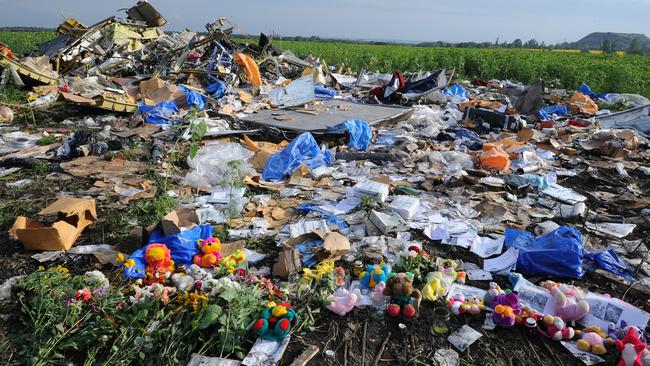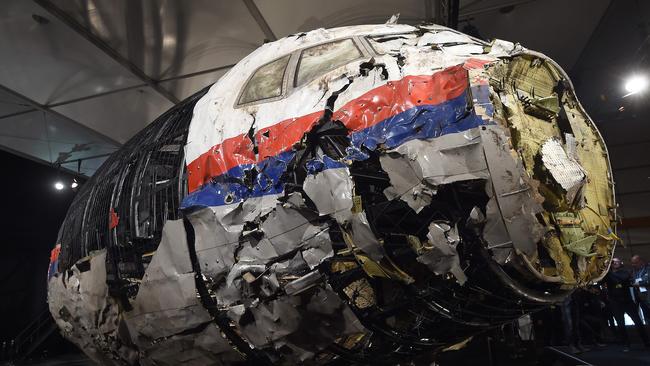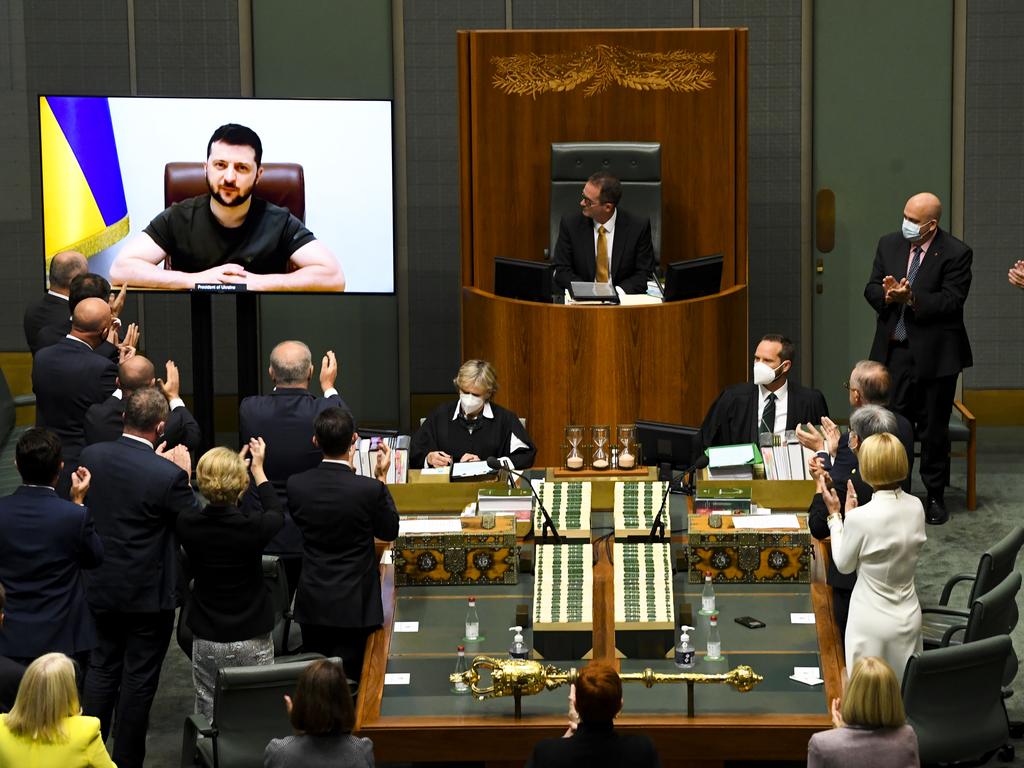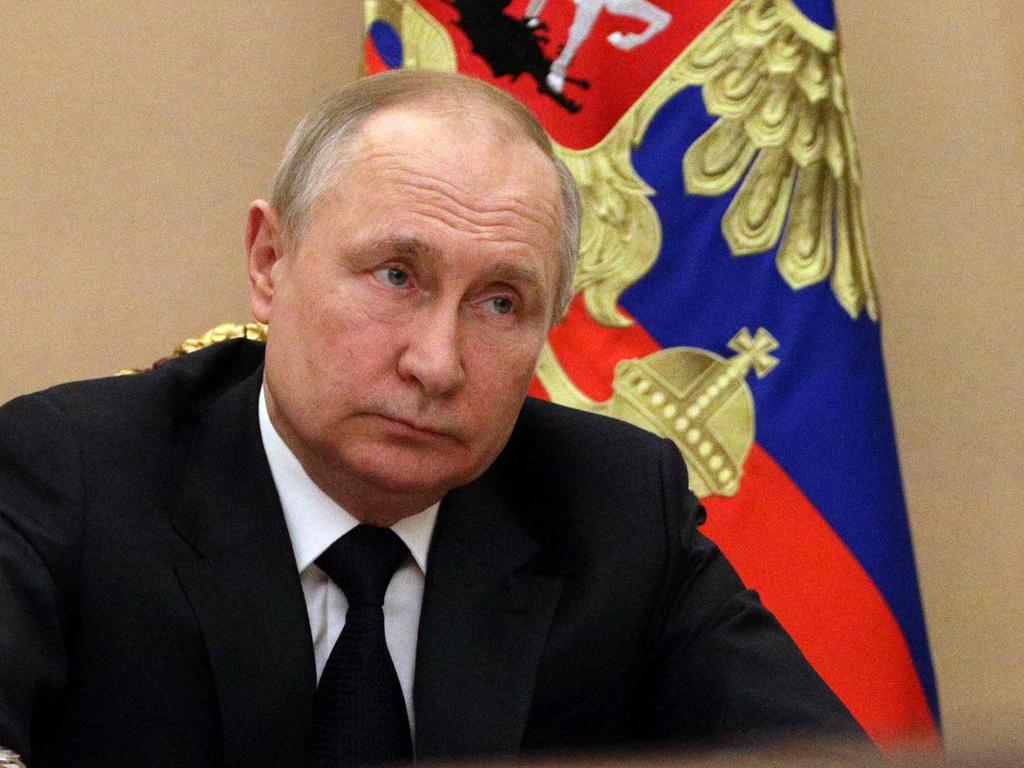International trial judgment not an end to MH17 inquiry
For the victims’ families, a court hearing has been raw and intense, yet the process has provided them with details of the hours before the plane exploded — and hope for accountability.

For the past 2½ years, four Russian separatists have faced an international trial, scrutinising their part in the murder of 298 people – including 38 Australians – when a Boeing 777 plane, Malaysia Airlines MH17, was blasted out of the sky above eastern Ukraine.
For the victims’ families the court hearing has been raw and intense, yet the process has provided them with details of the hours before the plane exploded and some comfort that despite Russia’s denial of responsibility, the victims do matter.
On Thursday, the international trial, held under Dutch law in Schiphol – just hundreds of metres from the runway where MH17 took off on July 17, 2014, only to be destroyed just two hours later – will announce a judgment on the four Russian rebels who are accused of organising and facilitating a Buk-Telar missile launcher to be transported from Russia into a rebel-held field near the village of Pervomayskiy, south of Snizhne.
Guilty findings or not, the families have been warned by various government authorities that this is just one of many legal steps. As well as there being no extradition treaty with Russia to hand over the men who are being tried in absentia, there are continuing inquiries by the joint investigating team headed by The Netherlands and Australia to prosecute others, including any Russian leaders, involved in the crime.
The men on trial are not accused of pressing the button that launched the Buk missile 33,000 feet into the sky, locking on to the passenger plane that was headed to Kuala Lumpur with families headed to Bali or further afield to Australia, returning home from European jaunts or attending an international AIDS conference in Melbourne.

The four were senior commanders in the separatist movement, the Donetsk People’s Republic (DNR) fighting in eastern Ukraine just months after Russia had annexed Crimea and the Donbas region. The prosecution has provided to the court a detailed narrative about the links between the four men and their important roles in the rebel-held territory.
The most senior, Igor Girkin (also known as Strelkov) is a 51-year-old ex-colonel in the Russian security unit FSB and was the minister for defence of the DNR commanding the rebel forces. Even now Girkin is on the Ukraine front line fighting for Russia, raising hopes that he may be eventually caught by Ukraine.
Back in 2014 prosecutors say he was the link man with Moscow, requesting military deliveries – tanks, armoured personnel carriers, artillery vehicles and ammunition for the DNR fighters.
Girkin’s deputy, 60-year-old Sergey Dubinsky, whose voice was captured on some of the 150,000 phone intercepts as “Khmury”, is a former Russian intelligence officer and in 2014 was the head of intelligence for the DNR.
In a key series of phone intercepts in the day before MH17 was shot down and played at the trial, Dubinsky asks Girkin for a Buk-Telar to help his rebel forces south of Snizhne in the heart of the battle zone.
Prosecutors say Dubinsky co-ordinated the transport of the Buk, which had come from Russia’s 53rd anti-aircraft missile brigade based in Kursk, to the launch site, as well as securing it, and then moved it out of the area back into Russian territory after the deadly missile had been launched.
The third man, Leonid Kharchenko, who has a Ukraine passport, headed the Krot Reconnaissance Battalion of around 350 men. They helped provide security for the Buk as it was transported into position.
He and his men reported to the only one of the four accused to defend himself at the trial: former Russian intelligence official Oleg Pulatov, 50, a former lieutenant colonel in the Russian Armed Forces in charge of around 1150 rebels.

Crucially, the prosecution obtained information from several whistleblowers, including one member of the Russian 53rd anti-aircraft missile brigade and another who was helping guard the launch site. Some have been given new protected identities in a third country.
The Dutch system is an inquisitorial one, different to Australia’s court system, and the defence has been unable to cross-examine many of these witnesses because of what the prosecutor says is “an established, disturbing pattern of active involvement on the part of the Russian security services … in murders in other countries”.
Witness M58, a pro-Russian fighter, was examined for four days last year and says he saw a large aircraft shot down from the field by a Buk.
“At first, everyone was happy because they thought they had shot down an enemy aircraft. This changed once it became clear that the downed aircraft was a civilian passenger jet,’’ M58 told the court. He said when the fighters returned from the plane crash site they were “devastated” because there were children’s toys everywhere.
Pulatov gave evidence to the court via three videos recorded in Russia alongside his lawyers saying: “I am not guilty. I have nothing to do with the disaster of July 17, 2014.” He has also contended that the court procedure is flawed and the outcome pre-determined. He said taped conversations were not about a real Buk but were part of a disinformation campaign to convince the Ukrainians that the separatists did have a Buk as part of its air defence.
“It is the prosecution’s main aim to get a conviction by any means,” he said in his evidence, before dramatically insisting “Acquit me”.
But prosecutors allege in early July 2014 Pulatov was part of the close knit military leadership under Girkin and Dubinsky, acting daily directly with each other to destroy aircraft.
At the time Pulatov was operating on the front line of the DNR forces and had been undertaking reconnaissance to create a corridor from the Russian border to the area of upcoming combat operations south of Snizhne. The prosecutors said Pulatov helped decide tactics and reported to Dubinsky.
Around this time the separatists had no aircraft, but in the four months before the MH17 disaster they would bring down 12 Ukrainian helicopters and four aircraft with air defence systems. This intensified from July 1 when six Ukrainian aircraft were attacked by the separatists including the downing of an Antonov-26.
But at the same time the Ukrainian air force was inflicting heavy losses on the separatist fighters. On July 16 at 18.12 – the evening before MH17 was destroyed – Pulatov talked to Dubinsky about the need for heavier air-defence systems. Dubinsky indicated that Girkin was in contact with Moscow.

In another phone call Dubinsky said the rebels had no answer to the Ukrainian fighter jets, called sushkas, and asked the deputy of the Vostok battalion – based around Donetsk – for a Buk in the morning
Soon after this, the intercepted calls reveal the Vostok deputy, Alex Semenov, told Dubinsky “that thing” was coming to him “in two units”. Straight away, at 20.11, Dubinsky phoned Pulatov to tell him that if a Buk was brought that night, it would go directly to him.
“That Buk is our only hope,” said Dubinsky. “We have no other option.” Later that night a rebel unit had taken the town of Marinova, but Ukrainian fighter jets killed 10 of the separatist fighters. On the intercepts Dubinsky consoled that particular commander, informing him: “A Buk is arriving tonight and then all problems will be solved.”
Crucially, prosecutors claim that Pulatov served as a link between the intelligence branch of the DNR – with direct access to spotters and their observations of enemy aircraft – and the crew of the Buk. They say phone records show calls between Pulatov’s intelligence men, and the intelligence service and the Buk crew, including a 60-second conversation shortly after the Buk was put into position in the agricultural field of Pervomayskiy.
In a later phone intercept 28 minutes after the missile was fired but before the rebels were aware the downed plane was a commercial airliner Kharchenko reported to Dubinsky: “We are on the site, we’ve already shot down a sushka”, to which Dubinsky replied: “Good job, you guys, well done! Downed a sushka … Well done!”

Later the two men talked with Pulatov and Girkin, having quickly reformulated a version of events. Pulatov told Kharchenko it was a sushka which brought down the passenger jet.
Kharchenko, though, was initially confused that someone else was getting credit for the hit.
He said: “No, no, no, it was we who were working on that sushka.” Pulatov quickly replied: “No, I know that. It’s that this sushka right before that had shot down that Chinese (Malaysian) thing. And only then did we pick up on that sushka. Now the whole world is going to rumble over this.”
Kharchenko, perhaps realising the attack on a Ukrainian fighter jet had maybe gone wrong, replied “I got you.”
Extensive evidence shown to the court shows that only one plane was shot down that day, MH17.
Prosecutors have called for life sentences if the men are found guilty of providing an anti-aircraft missile system that resulted in the murder of the 298 victims, but the likelihood of them being imprisoned is remote.
There are no extradition treaties between The Netherlands and Ukraine or Russia.
But the families hold out hope for future reckonings much like the war crimes trials that eventually caught up with Balkans’ butchers decades after their atrocities. Meryn O’Brien, the mother of Sydney victim Jack O’Brien, 25, says she is prepared that such justice may not even happen in her lifetime but hopes her daughter, Bronwyn, sees the people responsible for Jack’s death held to account.







To join the conversation, please log in. Don't have an account? Register
Join the conversation, you are commenting as Logout